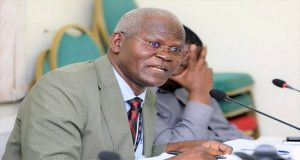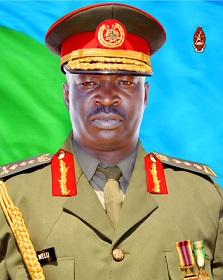
CAF has on Wednesday confirmed a joint bid by Uganda, Kenya and Tanzania to host AFCON 2027.
The news has received positive reception in the three nations.
But what does Kenya benefit from co-hosting Afcon 2027?
In this article, we reproduce The Star’s piece which was first published on their website on May 16, 2023.
The decision by the three East African countries to present a joint bid to co-host the 2027 Africa Cup of Nations is a move in the right direction.
President William Ruto made the announcement on Monday at State House while unveiling the East African Community ‘Pamoja Bid’ for the AFCON 2027. Ruto said the submission is part of the government’s plan to tap into the wide pool of skills and talents in the country.
Kenya is seeking to co-host the Africa Cup of Nations alongside neighbours Uganda and Tanzania. Kenya is set to present Kasarani, Nyayo and Kipchoge Keino Stadium in Eldoret as the designated venues for the prestigious event.
The three stadiums need a number of requirements as per Caf regulations. Among them are floodlights with a minimum capacity of 1200 lux for the quality of higher definition television coverage, a minimum of 30,000 seats per stadium with VIP and VVIP seats separated from each other, emergency lighting, a public address system and big screens.
Additionally, a media area that can host 50 media representatives for conferences and training grounds equipped with standard equipment such as dressing rooms with at least 23 seats, lockers and movable goals also form part of the requirements.
Against the backdrop of inadequate infrastructure, there is no doubt that the biggest benefit of co-hosting the tournament will be the legacy it will leave behind. This will include the many upgraded and significantly enhanced infrastructure that will remain behind once the curtains come down on the 2027 tournament.
While many locals may fail to grasp the opportunities that rest in hosting the Afcon, the benefits are immense and include short-term economic boosts such as the surge in Small Medium Enterprises (SMEs) that form the backbone of President Ruto’s Bottom-Up economic model.
The land transport sector — the boda bodas— will gain massively as the operators ferry spectators from different parts of the country to the stadiums. Those who will be selling food and drinks to the fans will equally benefit immensely from the large number of customers available.
Visitors, athletes and media who will converge in the country during the tournament will spend and inject money into the local economies. This will also boost the tourism sector as more visitors will flow into the country before and during the event.
Co-hosting the 2027 Afcon also means automatic qualification for Kenya and an opportunity for our players, coaches and administrators to learn first-hand and exchange notes with seasoned campaigners in various fields and Caf officials on the technical and tactical aspects of the game. The country will be updated on the upgrades required in its infrastructure so as to fit the requirements to host even world events.
In addition to the expansion of stadiums and related infrastructure, other important social amenities such as roads, hotels, lodges, restaurants, public and private transport providers, street lighting systems, and entertainment parks, amongst others, are also set to undergo automatic refurbishments due to the magnitude of the event and the possible economic spill-overs.
During these refurbishments, the youth will get employment as constructors and service providers on the construction sites.
An inflow of so many visitors during the tournament would require a strong internet speed and bandwidth. The upgrade of the same will be yet another plus for Kenya and its residents, long after the matches are concluded.
Our national broadcaster, the Kenya Broadcasting Corporation, also stands to score in terms of improved broadcast infrastructure. The national broadcaster will be awarded the opportunity to showcase the event to Kenyans who will not make it to the cities.
For it to be effective and efficient, modern and standard equipment are essential, thus the government will have to spend on the purchase of modern equipment. This will be a long-term win for the broadcaster.
This event falls in the same year as the general elections and can be used to champion peaceful campaigns and the electoral process.
Co-hosting the event will also boost the relationship between the three countries, thus enabling the free movement of people and goods.
Four years is enough to erect all the required infrastructure and with CAF seemingly leaning towards giving hosting rights to first-time bidders, our chances are indeed great.
Uganda and Tanzania are prepared to go without us and thus Kenya should move with speed to beat the deadlines set by Caf and prevent a repeat of the 1996 Afcon and 2018 Chan failures.
Credit: The Star








